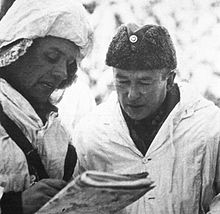Hjalmar Siilasvuo
| Hjalmar Siilasvuo | |
|---|---|

Hjalmar Siilasvuo (at right) receiving a situation report of Battle of Raate-Road
|
|
| Born |
18 March 1892 Helsinki, Grand Duchy of Finland |
| Died | 11 January 1947 (aged 54) Oulu, Finland |
| Buried at | Oulu Cemetery |
| Allegiance |
|
| Service/branch |
Imperial German Army Finnish Jäger troops Finnish Army |
| Years of service | 1915–1947 |
| Rank |
Gruppenführer (Germany, 1916) Lieutenant General (Finland, 1940) |
| Commands held |
Brigade Siilasvuo (Winter War) III Corps (1941–1942 and 1944) Group Lapland (1944) I Division (1944–1947) |
| Battles/wars | |
| Awards |
Iron Cross Order of the White Rose Order of the Cross of Liberty Mannerheim Cross |
| Other work | Writings, Municipal Council |
Hjalmar Fridolf Siilasvuo (birthname: Hjalmar Fridolf Strömberg, 18 March 1892, Helsinki – 11 January 1947) was a Finnish lieutenant general who led troops in the Winter War, Continuation War and Lapland War. He also saw action as a part of the Finnish volunteer "Jägerbattalion 27" fighting on the German side in World War I.
The son of a newspaper editor, Siilasvuo had studied law, and been involved with politics in the Ministry of Education. He was an officer in the Jäger Battalion in Germany during World War I, and later became a battalion commander during the Finnish Civil War. He was opinionated, but a cunning military commander.
Siilasvuo was a colonel that Mannerheim assigned to lead JR-27, Finnish troops sent to oppose two Red Army divisions, the 163rd and 44th, at Suomussalmi during the Winter War. Siilasvuo fought the 163rd division, fully aware that if the 163rd and 44th ever met up, it would be all over for the defenders of Suomussalmi. While fighting the 163rd division, Siilasvuo sent troops to take advantage of the terrain the slow moving 44th was using to pin the division, so they could go no further. The 44th were a crack division, but their expertise was fast moving mechanised warfare, and the terrain meant they had to leave their heavier equipment behind, go slowly with what they had. The unit had plenty of skis but few in the division could ski. After dealing with the 163rd mottis, the Finns looted weapons and equipment and used them to attack the pinned 44th. Even though they were tired from destroying the 163rd, the division's spoils immediately raised morale amongst the troops, convincing them they could finish the 44th from two directions - north and south.
...
Wikipedia
